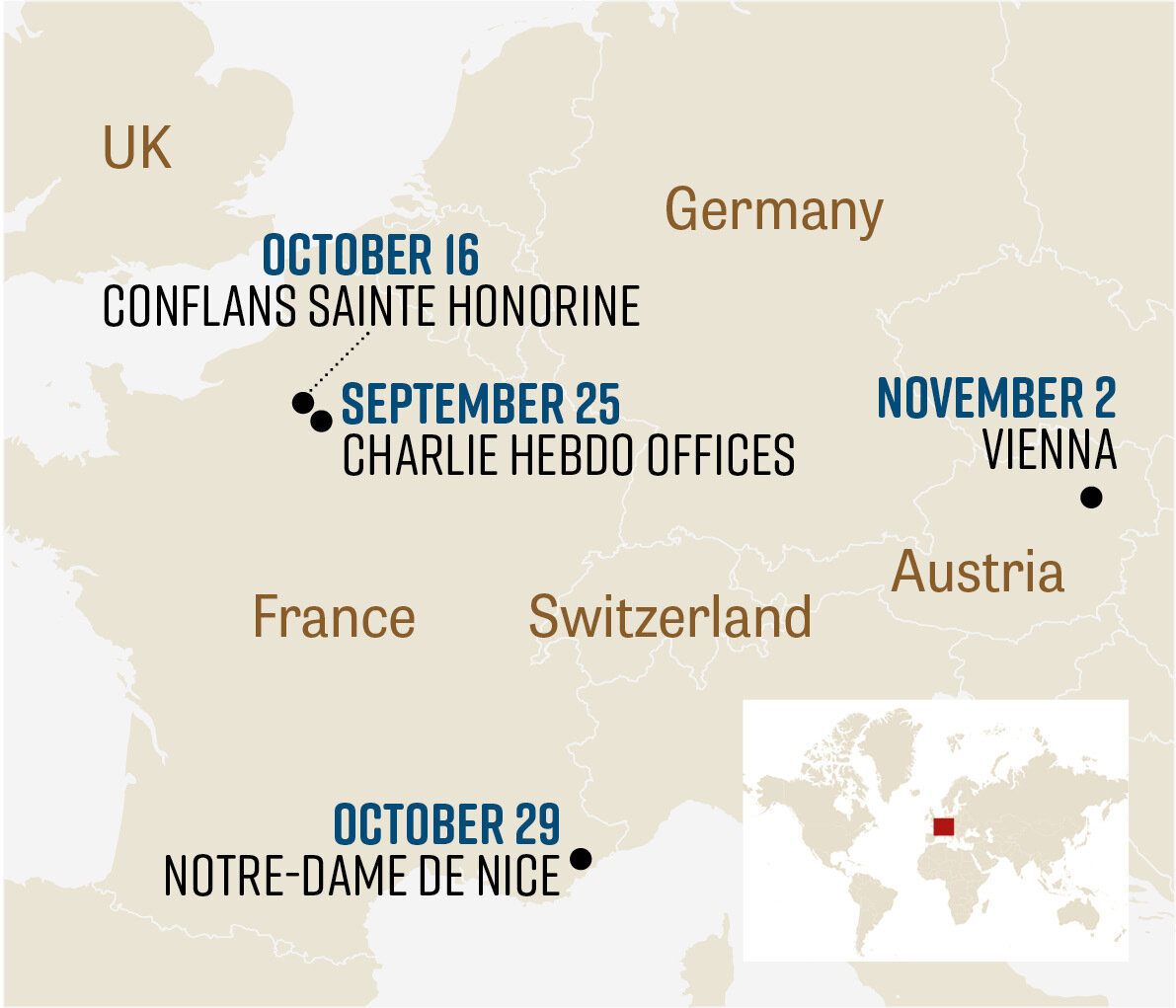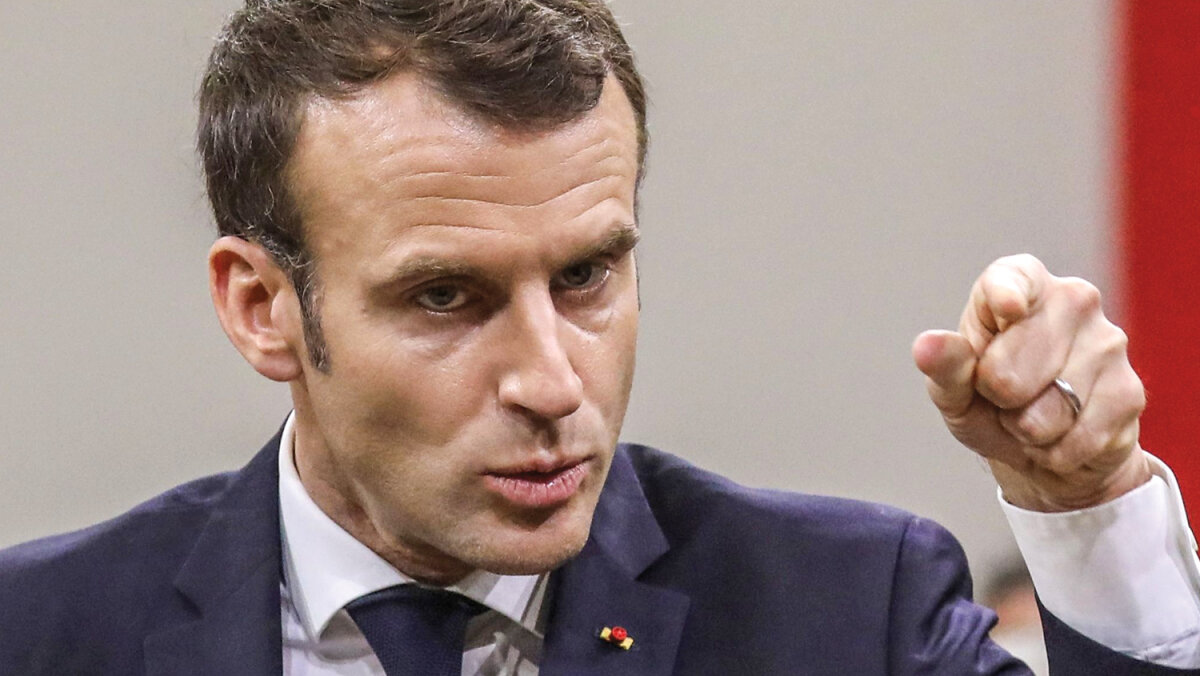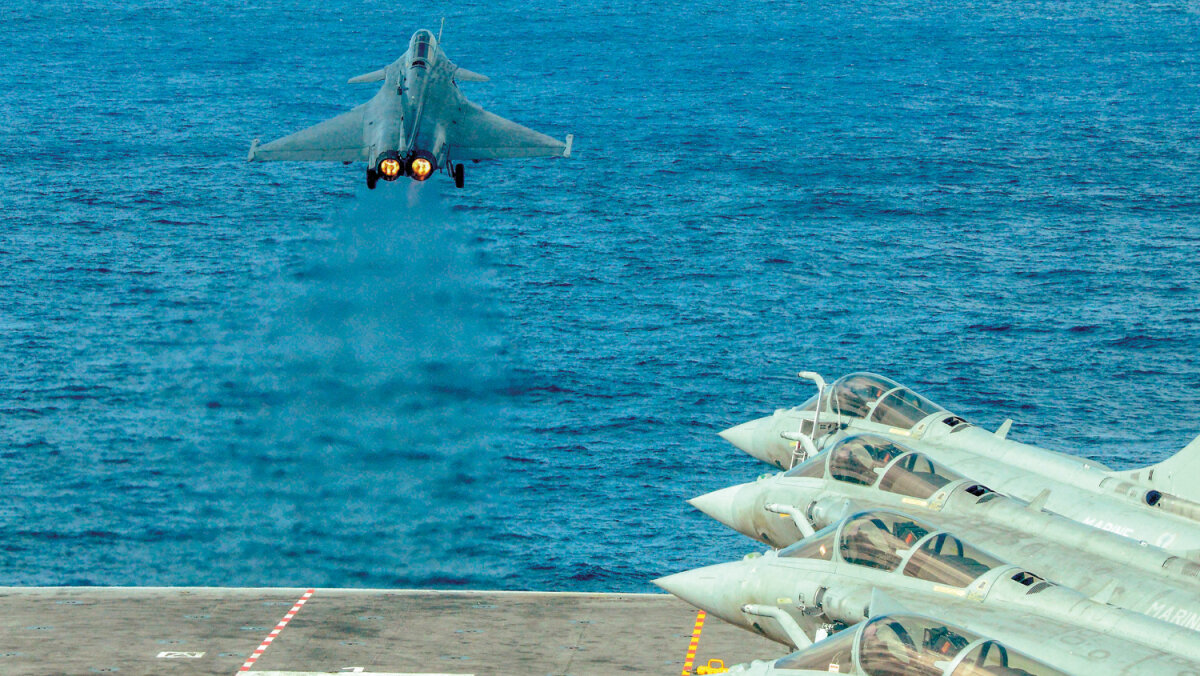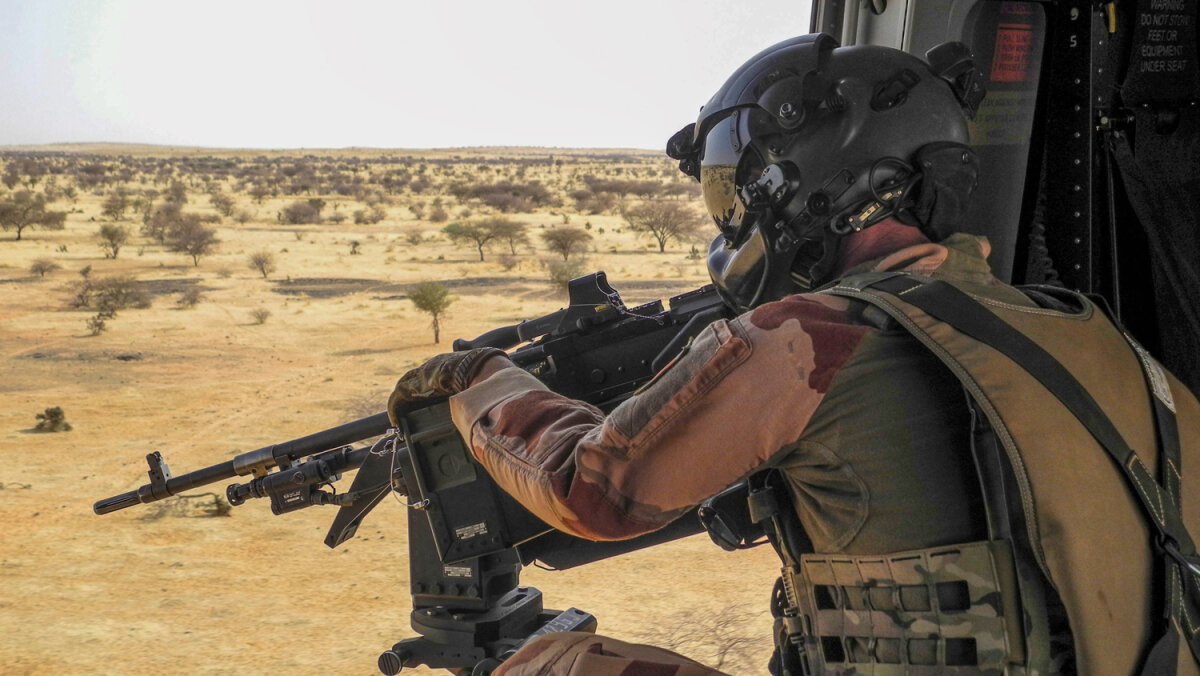Liberté, Égalité, and Down With Muslims!
“Islamic extremism must be crushed.” That was the bold, controversial statement made by Marine Le Pen, leader of France’s far-right National Rally party (formerly known as the National Front), in 2015 after a terrorist attack in Paris. “The hate preachers must be expelled. The Islamic mosques must be closed.”
For these comments, her rivals and the media attacked her. Le Pen lost the 2017 presidential election to Emmanuel Macron, who claimed to represent the opposite of her xenophobia.
Three years later, Mr. Macron sounds a lot like Le Pen. Islam, he says, is in crisis. His government has assumed tough new powers to shut down mosques and kick out preachers. And he has the public’s support. Attitudes toward Islam in France are hardening—fast.
The Middle East is reciprocating. Muslims are urged to boycott French products as leaders speak out against the shift in France. Hostility against not only France but all of Europe is growing stronger.
France Under Attack
President Macron has given police forces expanded powers of search and seizure with limited oversight from French courts. Police can shut down “places of worship in which are disseminated the writings, ideas or theories that provoke violence, hatred and discrimination,” wrote the Washington Post (Oct. 13, 2017).
Despite all the measures the French government has taken, attacks keep coming.
On Sept. 25, 2020, a man hacked two people with a meat cleaver outside of the former offices of the French satire magazine Charlie Hebdo. The attacker was an 18-year-old Pakistani migrant who arrived in France three years ago as an unaccompanied minor. He said he was motivated by Charlie Hebdo republishing the controversial caricature of Mohammed that it originally published in 2015. Meanwhile, 14 suspects in the 2015 Charlie Hebdo terrorist attacks are currently on trial.
On October 16, a young man shouting, “Allahu akbar,” beheaded history teacher Samuel Paty in broad daylight in the Paris suburb of Conflans Sainte Honorine. The 18-year-old Chechen refugee, Abdullakh Anzorov, was retaliating for Paty having shown his class cartoons depicting Mohammed during a lecture about free speech. Anzarov didn’t know Paty and wasn’t even from Paris; he was from a town some 60 miles away. The murder caused thousands of Frenchmen to ignore covid restrictions and gather for mass protests in favor of free speech.
On October 29, a man with a 12-inch knife entered Basilica of Notre-Dame de Nice, before morning mass. He repeatedly shouted, “Allahu akbar!” before practically decapitating an elderly woman. He slit the throat of a church official and repeatedly stabbed another woman who later died of her wounds. The killer, Brahim Aouissaoui, is a 21-year-old Tunisian national who had been in France for about a month. He had entered the European Union via Italy on September 20, most likely as an illegal migrant; the only identifying document he carried was a form from the Italian Red Cross.

A few days later, on November 2, a jihadist shot 27 people in an attack on the streets of Vienna, Austria, near the city’s main synagogue. The street was busy as Austrians were enjoying their last night of freedom before a covid lockdown set in. Four were wounded fatally before police killed the attacker.
In response to these attacks, President Macron is hardening his country’s approach to Islam.
France Rallies
On Oct. 2, 2020, one week after the first attack, Macron gave a landmark speech at the Paris suburb of Les Mureaux proposing new laws. He seeks to ban mosques from importing imams from abroad. Homeschooling would be outlawed for French youth, with an exception for children with valid medical excuses. The “burkini,” the modest female swimsuit used by many Muslims, would also be outlawed. He advocated more government oversight over Arabic-language classes and private schools in general. Already, one mosque in the Paris region of Pantin has been ordered to close for six months as a result of these proposals.
“Islam is a religion living through a crisis today, everywhere in the world,” Macron warned.
During a speech after the Paty beheading, Macron stated, “It was no coincidence that the terrorist killed a teacher, because he wanted to kill the republic and its values. … The battle is ours and is existential” (emphasis added). He believes he is fighting for the survival of France as we know it.

Macron’s government is taking his calls to arms seriously. Interior Minister Gérald Darmanin has been aggressive, arresting suspected radicals en masse and pledging to deport them. He has dissolved at least 51 French Muslim organizations, apparently with little more than the stroke of a pen, some at the personal request of President Macron. Darmanin called one organization, the Collective Against Islamophobia in France, an “enemy of the republic.”
France is also combating Islamic extremism abroad. French troops fought in the coalition that defeated the Islamic State in Iraq and Syria. French peacekeepers maintain a heavy presence against Islamic militants in the West African nation of Mali. Macron pressured the Lebanese government to reduce the power of radical Islam and to make other reforms in exchange for aid in the aftermath of the Aug. 4, 2020, Beirut blast. Macron’s popularity in Lebanon has expanded so dramatically that many Lebanese say they not only want Hezbollah Islamic extremists out of their government, but to return to French colonial rule. Macron has also stood up to an increasingly Islamic government in Turkey, sending French warships to the eastern Mediterranean to counter Turkey’s excursion into EU-claimed waters in the search for fossil fuel deposits.
Macron is also pushing for clearer, stronger external borders around Europe as a whole. On Nov. 5, 2020, at the Spanish border, he said Europe needs a real border security police force. He has also called for more central control over Europe’s borders, with EU member states coordinating their individual security under federal direction. If Macron succeeds, it would be easy to make such a force completely centralized and beyond the powers of individual member states.
Macron is basically advocating an interior ministry capable of controlling both freedom of movement and the national borders of its member states across the entire European Union.
Seeing what Macron’s France is saying and doing, the Islamic world is biting back, with venom.
Angering Islam
Turkish President Recep Tayyip Erdoğan reacted at a party congress in the Turkish city of Kayseri on Oct. 24, 2020: “Macron needs mental health treatments. What else can be said to a head of state who does not understand freedom of belief and who behaves in this way to millions of people living in his country who are members of a different faith? First of all, a mental examination is [necessary].”
Macron then recalled his ambassador to Turkey in Ankara. Erdoğan has since called for a boycott of French businesses in Turkey, saying on October 26, “I appeal to my people. Don’t ever pay attention to French brands. Don’t buy them.”
He also said, “Muslims are now subjected to a lynch campaign similar to that against Jews in Europe before World War ii.”
Turkey wasn’t the only Muslim state to boycott French businesses. Several distributors in Kuwait and Qatar have pledged to rid their shelves of French products. Qatar University has indefinitely postponed its “French Cultural Week.” Outside the French Embassy in Baghdad, Iraq, dozens of protesters burned French flags and photographs of President Macron. In Gaza, Palestinian protesters tore down a banner hanging in front of the Gazan French Cultural Institute and replaced it with a poster reading, “Our prophet will be victorious.”
Iranian Foreign Minister Mohammed Javad Zarif posted on social media on October 26: “Muslims are the primary victims of the ‘cult of hatred’—empowered by colonial regimes and exported by their own clients. Insulting 1.9 [billion] Muslims—and their sanctities—for the abhorrent crimes of such extremists is an opportunistic abuse of freedom of speech. It only fuels extremism.”
The EU quickly rallied behind France. German Foreign Minister Heiko Maas said Erdoğan had hit a “new low” with his attack on Macron. Dutch Prime Minister Mark Rutte said, “The Netherlands stands firmly with France and for the collective values of the European Union.” EU High Representative Josep Borrell tweeted in response to President Erdoğan’s comments: “The President’s remarks @RTErdogan against the President @EmmanuelMacron are unacceptable. Call on Turkey to stop this dangerous spiral of confrontation.”
When Austria suffered a terrorist attack on Nov. 2, 2020, Macron quickly showed solidarity with Vienna, tweeting: “This is our Europe. Our enemies must know who they are dealing with. We will not give up anything.”
Under Chancellor Sebastian Kurz, Austria responded to the attack by cracking down on Islamist operations in that country, including those of two Iranian-affiliated terrorist groups, Hamas and the Muslim Brotherhood.
A Prophesied Clash
Today it’s a major basilica on the French Riviera and the main synagogue in Austria. Where will the next attack take place—at a Christmas market in Munich? At mass in Saint Peter’s Basilica in Vatican City? These uncertainties and possibilities are putting the entire Continent on edge.
Europe and the Middle East are entering a cycle of hostility that the Bible foretells will erupt into major warfare.
Daniel 11:40 prophesies of two power blocs in the Middle East-Mediterranean region: a “king of the south” and a “king of the north.” As we show in our free booklet The King of the South, the northern power corresponds to a European bloc, led by Germany—a successor to the old Roman Empire. The southern power corresponds to a radical Islamic bloc, led by Iran.


Daniel prophesied that the king of the south would “push” against the king of the north. Gesenius’ Hebrew–Chaldee Lexicon defines push as “to strike—used of horned animals,” or “to push with the horn.” The foreign policy of Iran and radical Islam is already pushy, and, by sponsoring terrorism, deadly violent in some cases. This is provoking Europe.
The French and all Europeans are escalating their involvement in the Middle East, and this will accelerate as the United States pulls out. Bible prophecy specifies, however, that this growing “clash of civilizations” does not mean Europe will go to war against all Islamic nations. Europe will have allies among more moderate Islamic states as it takes on the most radical Islamic nations. We can see this already as this push is prompting Macron to draw closer to Lebanon and look for bases across the Middle East (read “Deadly Flaw in Mideast Peace Deals,” page 15).
For years, France has refused to confront radical Islam as it grew within its borders. Now the government is strengthening itself to confront that problem. But aspects of the new approach point to a new authoritarian direction for the country.
Macron’s proposed homeschooling ban would apply universally to France’s estimated 50,000 homeschooled children, not just those who are Muslim. Homeschooling is the only way for parents to opt out of governmental propaganda in schools, which is why it was banned by Adolf Hitler, for example. This would be a major change to the French educational system, but the Islamist crisis is allowing it to be pushed through with little debate.
France prides itself on being a secular nation. But tensions with the French Muslim community are causing many to reexamine what it means to be French. Many are turning from secularism back to the religious root of France: Catholicism. The southern French city of Avignon was once the headquarters of the papacy in the Middle Ages. One of the major annual pilgrimages for Catholics is to travel to Paris to see the alleged crown of thorns displayed in Notre Dame Cathedral for Easter. Napoleon was crowned “emperor of the French” in the presence of the pope. The flag of the Free French Forces in World War ii featured the Cross of Lorraine, a historic Catholic symbol of France.
The fact that one of the recent radical Islamic attacks took place in a church is an important reflection of Catholicism’s integral nature in France. To an Islamist, if you want to attack France, you attack a church. In response, many Frenchmen have rallied around the church.
The Bible also predicts that France—with the rest of Europe—will return to its Catholic roots, stamping out not only Islam but all non-Catholic dissenters.
The book of Revelation describes a beast power that directs public worship (Revelation 13:11-18). It has the authority to execute nonbelievers (verse 15) and imposes a “mark” on “all, both small and great, rich and poor, free and bond” (verse 16). This mark is an identifying sign enforced by a religious power that excludes nonconformists from participating in society (verses 16-18). This prophesied beast power is the same power Daniel identifies as the king of the north: Catholic Europe.
France is already in early preparations for the reinstitution of a religion backed by governmental authority that outlaws some modes of worship. Islamic attacks will continue to drive the French and other European ideologies to become more Catholic, and their governments to become more Catholic and more authoritarian.
Massive changes are underway in Europe that will fulfill some of the most important prophecies in the Bible.
